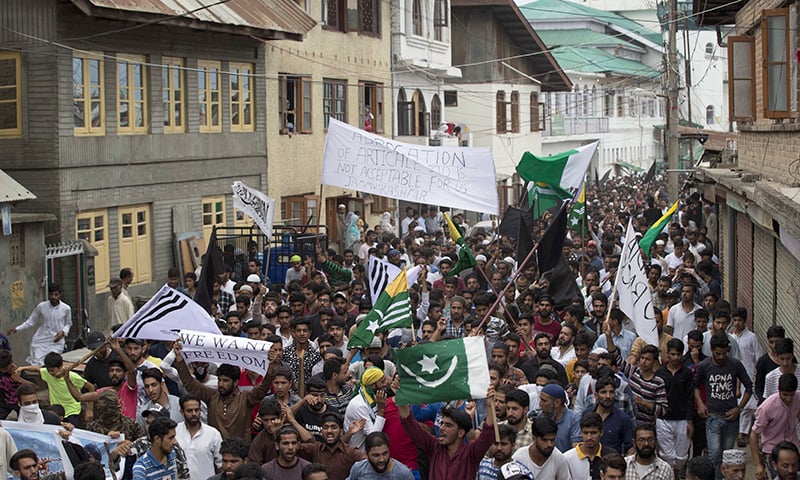“Abrogation of Article 370 is not acceptable for us,” read one of the banners as tens of thousands of protesters hit the streets of Jammu and Kashmir’s capital city of Srinagar on Friday. This major protest took place after the Friday prayers, demanding an end to the military siege and calling for the restoration of Article 370 and Article 35A, which provided special status to the State. Indian paramilitary forces and police used tear gas and fired pellets guns at protesters. Some live shots were also fired at them.
According to reports, 12 people were injured in the police action. Eyewitnesses said that the forces attacked the protesters from two sides, forcing many women and children to jump into the water. Last week, one protester died as he was being chased by the police and was forced to jump into the river.
The Indian government denied that protests took place, but exclusive footage from BBC showed tens of thousands protesting in Srinagar’s Soura area.
WATCH: Despite government saying reports of protests in Saura were completely fabricated, see exclusive BBC footage here for the truth. Thousands marched, police fired on protesters, dozens injured #Kashmir #BBCUrdu pic.twitter.com/J0S72XuK1W
— Nicola Careem (@NicolaCareem) August 10, 2019
The protest comes after Indian forces arrested more than 500 political and civil rights activists and severed all communication lines, including mobile and landlines. The lockdown was imposed as the far-right Indian government headed by the Bharatiya Janata Party (BJP) moved to abrogate Article 370 and bifurcate the State of Jammu and Kashmir into two union territories ( areas administered directly by the Indian government). The abrogation, which was done with a presidential decree on August 5, had been condemned as unconstitutional and an attack on Kashmiri people. The decision was taken without any consultation with the people or political forces of Kashmir.
The left parties in India, including Communist Party of India (CPI), Communist Party of India (Marxist) (CPIM) and Communist Party of India (Marxist-Leninist) Liberation (CPIML) on August 7 had organized a countrywide protest against the government’s Kashmir move.
Leaders of CPI(M) and CPI detained at Srinagar airport
Sitaram Yechury and D. Raja, general secretaries of the CPI(M) and CPI, were detained by Indian authorities at Srinagar airport when they went to meet CPI(M) Central Committee member Mohd. Yusuf Tarigami and others members of the party. Yechury and Raja, who were also carrying medicines for Tarigami as he was not keeping well, were detained for around four hours and were not allowed to enter the city.
“Despite the knowledge that as the General Secretary of the CPI(M), a national political party, I had the right to visit my Party members and my Party leaders, particularly when they have health problems, I was denied my basic elementary democratic right,” wrote Yechury in a letter to the president of India.
“I have been denied my elementary democratic right when the current central rule functions under your authority. I am writing to you to register my strong protest against this denial of my democratic right,” he added.
Petition against abrogation of Article 370
Two petitions challenging the constitutional validity of abrogation of Article 370 were filed in the Indian Supreme Court. One of petitions was filed by a Kashmiri lawyer, Shakir Shabir, who also sought a direction to the government to prevent all forms of human rights violations and end the communication blockade. Another petition was filed by Mohammad Akbar Lone and Justice (rtd) Hasnain Masoodi, both Lok Sabha members belonging to the National Congress (NC), challenging the government’s move to abrogate the special status for Jammu and Kashmir.
The executive editor of Jammu and Kashmir-based Kashmir Times, Anuradha Bhasin, has also filed a petition in the Supreme Court, demanding media freedom and revocation of restrictions imposed on journalists. She also asked the court to give a direction for the restoration of communication lines in Kashmir.





